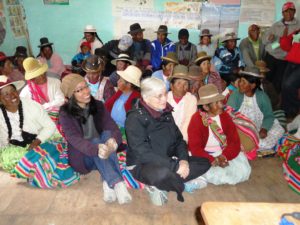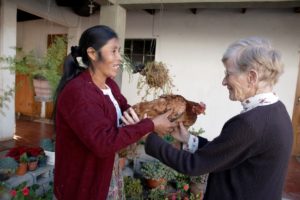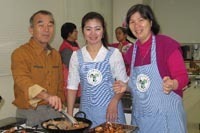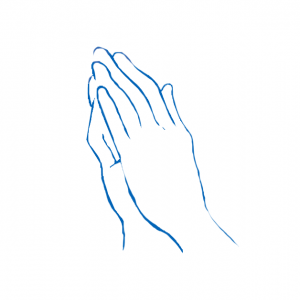Human rights are the most fundamental rights of all human beings, especially the most vulnerable, must be respected and protected in every situation.
Human rights stem both from reason (Compendium of the Social Doctrine of the Church, 153) and from our inherent dignity as human beings, because all human beings were given life by God and are made in his image and likeness (Genesis 1:27).
Every person has a fundamental right to life and a right to those things required for human decency. Corresponding to these rights are duties and responsibilities–to one another, to our families, and to the larger society.
Maryknoll Sisters see first-hand how the most vulnerable members of society are faring throughout the world. And in a society marred by deepening divisions between rich and poor, our tradition instructs us to put the needs of poor and vulnerable people first.
Sister Story: Sister Pat Ryan

After about three months of language study, she began her service in Juli, a district 12,800 feet above sea level near the southeastern border with Bolivia. There, she kept busy for many years, beginning with service to the indigenous Aymara people by offering courses in human rights, community development, and theological reflection. She rose through the ranks of the Rural Education Institute, eventually becoming the program’s coordinator in 1975. Through her efforts, many Aymara women and men were able to be registered as Peruvian citizens and exercise their constitutional rights including the right to vote. She held this position for six years until she transferred to the rural Aymara community of Camacani to begin a period of pastoral ministry in sixteen rural villages. After a severe draught she accompanied the villagers in obtaining potable water systems. In addition, she also held a position on the executive board of the Committee for the Defense of Human Rights for the Department of Puno, and served as editor for the ARUSA bulletin from 1978 to the present.
Of the people she serves, she says, “We are trying to transform Peru into a country where the life of all persons is recognized as sacred and not snuffed out by discrimination, exclusion, hunger, poverty, or violence.”
Her valuable work did not lessen as her ministry shifted; in 1986 she became a member of the Executive Committee of the Andean Pastoral Institute, headed by the regional bishops. After about two years she was named by the Bishop of Juli to found the Vicariate of Solidarity, which was the Diocesan a human rights organization. For many years this office served as the Church’s response to the systematic violation of human rights and to the situation of political violence in the South Andean Region of Peru, promoting life and peace and non-violence. She continued to serve the Peruvian community in this capacity until she was elected vice president of Maryknoll in 1997, at which time she relocated to the United States for her new leadership role. Her term lasted until 2002; she returned to Peru shortly after.
Sister Pat has continued her work in the advancement of human rights in recent years as President and Moderator of the NGO “Human Rights and Environment – Puno”. She and her team place special emphasis on indigenous peoples´rights and the right to water and a safe environment. In 2010 and 2011 she, along with the legal services of her team, brought a case of water contamination affecting indigenous communities in the region to the UN, which is awaiting resolution. She still lives among the Aymara in Peru today.
“I give thanks for the wonderful privilege and gift of sharing life with the Aymara people and for the possibility to serve in ministry in the Peruvian South Andes church,” Sister Pat remarked. “These 50 years have helped awaken in my being an ever growing appreciation of the dignity and sacredness of each and every person and of all creation in our global earth community. My deepest gratitude to our God of Life and Love, my dear family, my Maryknoll Community, co-workers, friends and benefactors and all the kindred spirits who have helped make this most blessed life’s journey possible.”
“Our sisters train people to speak out for their own rights, and to bring awareness and change to the government, so that all people, in particular poor, might live with dignity and the earth, from which we each derive our livelihoods, might be restored and protected.”
Sister Story: Sister Margaret Lacson, M.M.
In the high, hardscrabble plains of Peru’s Altiplano, the Aymara people are struggling to make a living. Despite poor soil and a harsh climate, they have persevered, growing potatoes, quinoa, corn, beans, barley wheat and a number of other vegetables native to the region, and raising llamas and sheep on the coarse grass and the waters of the Condoraque River.
Their lives became endangered some years ago, however, when it was found that a mining company located along the river was contaminating the waters and thereby causing many of the poor Aymaras’ livestock to die. Their whole way of living was being severely threatened.
One of the people who wasn’t about to let the Aymaras suffer was Maryknoll Sister Pat Ryan. Since 1971, Sister Pat Ryan has been serving the poor of Peru, and defending the rights of the indigenous people whom she loves so dearly.
Sister Pat is president of Human Rights and Environment of Puno, Peru, an organization which, in just the past three years alone, has helped equip indigenous people with understanding and skills to defend their human rights, successfully spoken out for those rights and seen mining companies back away from plans that would have continued to damage the lands and water so vital to the Aymaras’ livelihood, and legally represented these poor people against large corporations, resulting in decisions that will require the mines to remediate the environmental damages that have already been caused in the region, create programs to benefit the indigenous peoples of the area, as well as allow them to benefit financially from the proceeds such corporations may obtain through use of the land.
None of this would have been possible, Sister Pat says, without the generosity of the people who support her and Maryknoll Sisters, enabling them to fund the costs that are helping the poor of the Altiplano learn about their rights, as well as how to defend them in a non-violent manner, preserve their livelihood, and work with them toward public recognition of the Aymara people by the Peruvian as a distinct ethnic group with specific rights that must be protected.
Sister Pat and the Human Rights and Environment Office of Puno, the organization she currently serves as president, were among those honored for their efforts and achievements on behalf of the indigenous people of the Altiplano by Mayor Marino Catacora Ticona of the Quilcapunco District of Peru, just north of Lake Titicaca.
Sister Pat and her team are grateful for the progress they have made so far, but they know that securing human rights firmly for the indigenous people of the Altiplano are far from over. Legal cases brought against indigenous people, sometimes simply for exercising their rights to peaceful assembly, continue, as does the work the Human Rights and Environment Offices does in providing free information, orientation and consultation services to the general public, especially Aymara and Quechua peoples with limited financial resources. Training programs for indigenous peoples must continue, as must workshops for people in decentralized areas, and seminars with judges, public prosecutors and lawyers to familiarize them with basic documents related to the rights of indigenous people.



